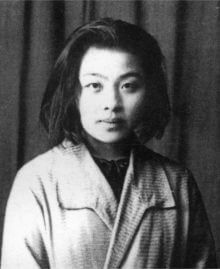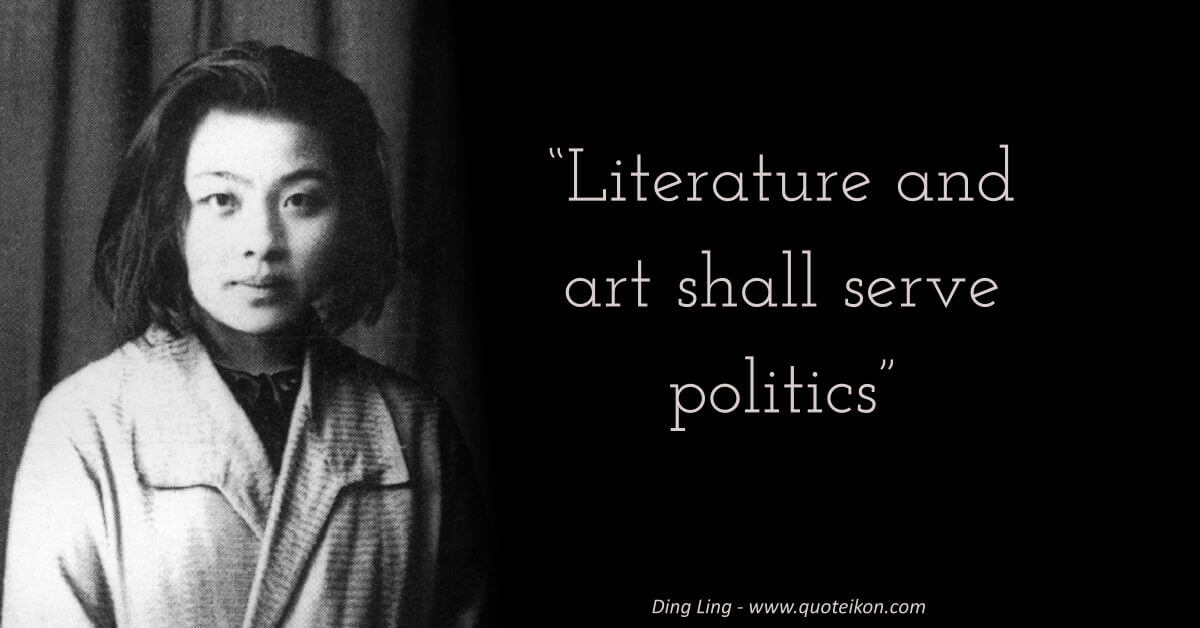
- Mini Bio
- Name: Jiang Bingzhi
- Born: 12th October 1904, Linli, Hunan, China
- Died: 4th March 1986, Beijing, China
- Alma mater: Yuyun Boys School, Pingmin Nuxiao Shanghai (peoples girls school) and Shanghai University
- Occupation: Writer and author
- Notable works: Meng Ke (1927), Miss Sophia's Diary (1928) and The Sun Shines Over The Sanggan River (1948)
- Marriage resume: Hu Yepin 1925 - 1931 (his execution) and Chen Ming 1942 - 1986 (her death)
- Pen name: Ding Ling
"In truth, it is I who have defiled myself, for one is one s own fiercest enemy"
Ding Ling"We find happiness fighting in the middle of a raging storm, not playing the lute in the light of the moon, or reciting poetry in the middle of flowers"
Ding Ling"I grew up in a small town, and was not very familiar with peasants and workers. I wrote about them and made them my protagonists"
Ding Ling"In 1957, a time of spiritual suffering for me, I found consolation in reading much Latin American and African literature"
Ding Ling"I can say that if I had not been influenced by Western literature I would probably not have been able to write fiction"
Ding Ling"As the Chinese revolution developed, my fiction changed with the needs of the age and of the Chinese people"
Ding Ling"Literature ought to join minds together… turning ignorance into mutual understanding"
Ding Ling"It was only after I went to Yan’an that I could write with substance"
Ding Ling"My earliest stories followed the path of Western realism"
Ding LingLiterature and art shall serve politics"
Ding Ling"Live and die your own way"
Ding Ling
Great quotes are not where you find great wisdom. It's where you share this knowledge that counts
Sharing Is Caring
Ding Ling Biography
Ding Ling was a literary revelation whose writing reflected a time in the distant future where Chinese women could be independent from the traditional roles of housewives and live meaningful lives where they could display their inner passions without being emotionally crippled by conformity or physically crippled by foot binding.
Chinese literary circles of the late 1920's supported her work and to the Chinese people she was like a breath of fresh air as she wrote about the trials and tribulations of ordinary people who had ambition to succeed and dreams to fulfill. She created Chinese heroine's that people could relate to and aspired to emulate. In her own life she shunned tradition by choosing her own husband Hu Yepin who was an aspiring poet who decided to turn to politics as his literary successes could not match his wifes.
He joined the League of Left-Wing Writers and subsequently the Communist party and Ding Ling continued her writing but still supported her husband. In 1931 Hu Yepin was arrested by the British police at the Oriental Hotel in the British concession of Shanghai and handed over to the Nationalist Kuomintang government who promptly executed him and his colleagues in an incident that would later see them held up by the Communist Party of China as the Five Martyrs of the League of Left-Wing Writers.
This action drove Ding Ling into the political sphere and her writings started to support left wing teachings and the struggle of the people leading her to join the Communist party in 1932. Her significance to the Communist Party was she was the first well known Chinese author to join the Revolution.
Chairman Mao Zedong welcomed her as a literary heroine of the Chinese people initially but the party were not ready for her Chinese feminist literature and her relationship with the party became strained resulting in her being expelled from the party and jailed for her open criticisms.
Despite her rocky relationship with the Communist Party she still won the Stalin Prize for literature in 1951 for her novel about the land reform movement of the 1940s; "The Sun Shines Over Sanggan River". This was the first Chinese novel to win this prestigious prize.
Although schooled in Mandarin, Ding Ling was influenced by a broader pen as she garnered inspiration from Gustave Flaubert, Qu Qiubai, Shen Congwen and Hu Yepin.
As the cultural revolution drew to a close in China she was freed in 1975 and eventually her party membership was restored. Outspoken writers are always good for a quick quip, so this is my compilation of 11 of the best Ding Ling quotes
Quotes About Ding Ling
Chairman Mao Zedong welcomed her into the fold by simply saying: "Yesterday an intellectual lady - today a military general"
The author and academic Yi-tsi Mei Feuerwerker lavished deserved praise when she said: "Ding Ling has been one of the great survivors in modern Chinese literary history. Not only has she survived the dangers of war, exile, hard labor, and imprisonment by the governments of both right and left; she has also endured as a creative and practicing writer"

